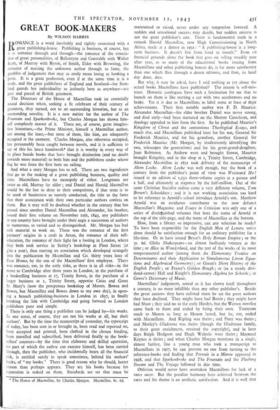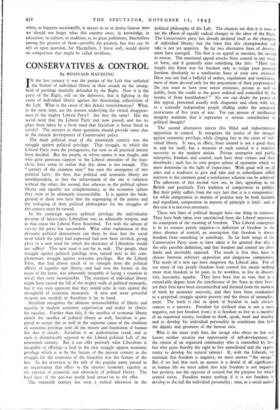GREAT BOOK-MAKERS
By WILSON HARRIS The Directors of the House of Macmillan took an essentially
sound decision when, seeking a fit celebrant of their century of greatness, they turned, not to an outstanding historian, but to an outstanding novelist. It is a new métier for the author of The Fountain and Sparkenbroke, but Charles Morgan has shown him- self completely master of it. There are, of course, great imagina- tive historians,—the Prime Minister, himself a Macmillan author, not among the least,—but most of them, like him, are adequately occupied at the moment. Charles Morgan, also otherwise occupied, has presumably been caught between novels, and it is sufficient to say of this his latest handiwork* that it is worthy in every way of its place beside books that have brought distinction (and no doubt rewards more material) to both him and the publishers under whose flag he was from the first bent on sailing.
And what a story Morgan has to tell. There are two ingredients
that go to the making of a great publishing business, quality and time. Macmillans have no monopoly of either. Longmans are twice as old, Murray far older ; and Daniel and Harold Macmillan would be the last to deny to their competitors, if that term is to be used of businesses so suavely conducted, the title to the fame that their association with their own particular authors confers on them. But it may well be doubted whether in the century that has passed since another Daniel Macmillan and Alexander, his brother, issued their first volume on November xoth, 1843, any publishers in any country have brought under their aegis a succession of authors so numerous, so varied and so distinguished. Mr. Morgan has had rich material to work on. There was the romance of the first partners' origins in a croft in Arran, the romance of their self- education, the romance of their fight for a footing in London, where they both took service in Seeley's bookshop in Fleet Street (at f6o a year), thus starting an association which developed strangely into the publication by Macmillan and Co. thirty years later of Ecce Homo, by the son of the Macmillans' first employer. There was romance, too, in the early risks, as there is in all risks—in the move to Cambridge after three years in London, in the purchase of a bookselling business at 17, Trinity Street, in the purchase of a larger business at r, Trinity Street, opposite Caius and Great St. Mary's (now the prosperous bookshop of Messrs. Bowes and Bowes, but Macmillan and Bowes down to my own day), in open- ing a branch publishing-business in London in 1857, in finally breaking the link with Cambridge and going forward as London publishers pure and simple.
There is only one thing a publisher can be judged by—his works.
In one sense, of course, they are not his works at all, but their authors'. But by the time the manuscript of yesterday, the typescript of today, has been sent in or brought in, been read and reported on, been accepted and printed, been clothed in the chosen binding, been travelled and subscribed, been delivered finally to the book- sellers' counters—by the time that elaborate and skilled operation, no part of which the author can execute himself, has been carried through, then the publisher, who incidentally bears all the financial risk, is entitled surely to speak sometimes, behind his authors' backs,- of "my books.' There is good reason why he should, better reason than perhaps appears. They are his books because his reputation is staked on them. Standards are set that must be * The House of Macmillan, by Charles Morgan. Macmillan, 8s. 6d.
maintained or raised, never under any temptation lowered. A sudden and sensational success may dazzle, but sudden success is not the great publisher's aim. There is fundamental truth in a remark Harold Macmillan, now High Commissioning in North Africa, made at a dinner in 1931: " A publishing-house is a long- term business. It doesn't live from hand to mouth." Even cm financial grounds alone the book that goes on selling steadily year after year, as so many of the educational books issuing from Macmillans and other publishing houses do, is far more satisfactory than one which flies through a dozen editions, and then, its brief day done, dies.
But why, it may be ask. cl, have I said nothing as yet about the actual books Macmillans have published? The reason is self-mis- trust. Homeric catalogues have such a fascination for me that to launch on them is like starting a car with two accelerators and no brake. Yet it is due to Macmillans to label some at least of their achievements. Their first notable author was F. D. Maurice. Alexander Macmillan—his elder brother Daniel was never strong, and died early—had been nurtured on the Shorter Catechism, and theology appealed to him from the first. So he published Maurice's Kingdom of Christ and the contentious Theological Essays, and much else, and Macmillans published later for his son, General Sir Frederick Maurice, and for his grandson, another General Sir Frederick Maurice (Mr. Morgan, by inadvertently identifying the two, telescopes the generations) and for his great-grand-daughter, Joan Robinson; As Andrew went and brought Simon, Maurice brought Kingsley, and in the shop at r, Trinity Street, Cambridge, Alexander Macmillan in 1851 took delivery of the manuscript of Alton Locke. Alton Locke was well enough, but the book of a century from the publisher's point of view was Westward Ho ! issued in an edition of 1,250 three-volume copies at a guinea and a half, and ultimately at sixpence by the half-million. Out of the same Christian Socialist milieu came a very different volume, Tom Brown's Schooldays ; and it is not working association too hard to let reference to Arnold's school introduce Arnold's son. Matthew Arnold was an assiduous contributor to the now defunct Macmillan's Magazine. and Essays in Criticism was only one of a series of distinguished volumes that bore the name of Arnold at the top of the title-page, and the name of Macmillan at the bottom.
How, from a library so impressive, can any selection be made? To have been responsible for the English Men of Letters series alone should be satisfaction enough for an ordinary publisher for a life-time. Or to have issued Bryce's Holy Roman Empire ; or the 3s. 6d. Globe Shakespeare—an almost foolhardy venture at the time ; or Alice in Wonderland, and the rest of the works of its most temperamental author (among them An Elementary Treatise on Determinants and their Application to Simultaneous Linear Equa- tions and Algebraical Geometry); or Green's Short History of the English People ; or Frazer's Golden Bough ; or (as a steady divi- dend-earner) Hall and Knight's Elementary Algebra for Schools ; or Grove's Dictionary of Music.
Macmillans' judgement, sound as it has shown itself throughout a century, is no more infallible than any other publisher's. Beside the great authors they have enlisted must be set the great authors they have declined. They might have had Barrie ; they might have had Shaw ; they said no to the early Hardys, but the Wessex novelist came back to them and ended by being their own. Tennyson stuck to Moxon as long as Moxon lasted, but he, too, ended with Macmillans. And Kipling was theirs ; and Pater was theirs ; and Morley's Gladstone was theirs (though the Gladstone family, to their great enrichment, retained the copyright),, and in later days Ralph Hodgson and Hugh Walpole were theirs ; Maynard Keynes is theirs ; and when Charles Morgan mentions in a single, almost furtive, line a young man who took a manuscript to Macmillans in 1927, he can prevent no one from turning to the reference-books and finding that Portrait in a Mirror appeared in 1928, and that Sparkenbroke and The Fountain and the Flashing Stream and The Voyage followed in due time.
Oblivion would never have overtaken Macmillans for lack of a vates saver. But the peculiar harmony here achieved between the vales and his theme is an aesthetic satisfaction. And it is well that • when, as happens occasionally, it occurs to us to praise famous men we' should not forget what this country owes, in knowledge, in education, in culture, in tradition, to its great publishers, Macmillans among the greatest of them—possibly the greatest, but that can be left an open question, for Macrnillans, I know well, would desire no comparison that might he called invidious.



























 Previous page
Previous page